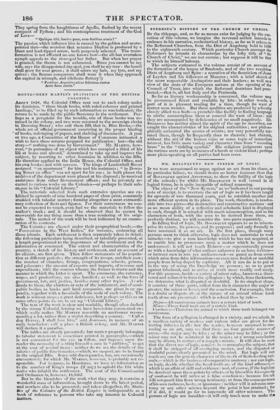STEBBING'S HISTORY OF THE CHURCH OF CHRIST,
BY the titlepage, and, so far as means exist for judging by the exe- cution of this volume, we imagine the reverend author intends to embrace in his narrative, ecclesiastical history, as far as it relates to the Reformed Churches, from the Diet of Augsburg held in 1530 to the eighteenth century. Which particular Church amongst the Reformers he intends to characterize by the lofty title of "the Church of Christ," we are not certain ; but suppose it will be that to which he himself belongs.
The subjects embraced in the volume consist of an account of the formation of the league of Smalcade, and of the two resuldess Diets of Augsburg and Spire : a narrative of the fanaticism of Jon of Leyden and his followers at Munster ; with a brief sketch of the more respectable Anabaptists and their leaders ; as well as a view of the state of the European nations at the opening of the Council of Trent, into which the Reformed doctrines had pene- trated,—that is, all but Italy and the Peninsula.
So fits as literary workmanship is concerned, the volume may be pronounced fluent and readable by bits : in other words, a part of it is pleasant reading for a time, though its want of matter soon wearies. But these qualities are produced by a ftculty closely allied to a fault—a preacher-like facility in finding language to clothe commonplace ideas or conceal the want of ideas : and they are accompanied by deficiencies of no small magnitude. Mr. STEBBING has neither seized the spirit of the age he describes, nor caught the characteristics of his original authorities ; nor philoso- phically estimated the causes of events ; nor very powerfully nar- rated them, though he frequently rises to rhetoric : but rhetoric, without the aid of the human voice or some topic of immediate interest, has little snore variety and character than from " sounding brass" to the "tinkling cymbal." His religious judgments upon the various sects are by no means of a harsh or violent kind ; perhaps more plain-speaking on all parties had been truer.


























 Previous page
Previous page